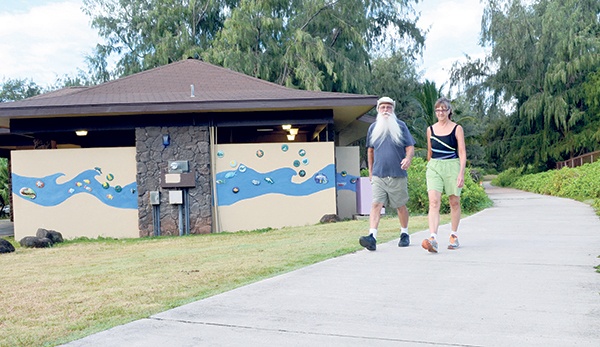LIHUE — Kapaa resident Peggy Kadey suffers from severe respiratory issues resulting from a chemical accident she had while living in Washington state.
After the incident, a respiratory specialist ordered that she and her husband escape to a warm environment where she could breath clean ocean air. So, the couple packed up and headed for Kauai.
Several times each week, Kadey visits Lydgate Beach Park. Last week, however, Kadey says she was shocked when she turned around to find the south comfort station at Lydgate tented off for fumigation. It was the first time she has ever seen chemicals used at the park, she said.
“It made me angry. It made me sad,” she said.
Had she not known the building had recently been fumigated and walked inside, Kadey says it would have likely killed her.
“I think they should have warning signs a long time afterwards,” as a warning to chemically sensitive people like herself, she said. “I won’t be able to use that restroom for a long, long time.”
In light of the complaint, the county says it is researching alternative, less-toxic termite treatments.
After receiving Kadey’s call last week, in which she expressed her concern about the fumigation and noted her sensitivity to chemicals, the county says it immediately contacted the termite company.
“We wanted to ensure that the proper signs were posted, the building was boarded and the tent was tightly sealed,” County Department of Parks and Recreation Director Lenny Rapozo said.
Rapozo said the decision to fumigate the building was made after researching the different methods available to address the dry termite problem, and it was determined that the method used would be most effective because the termites were not localized.
“The fumigation procedure was conducted in accordance with the stringent guidelines set by the regulatory agencies, and the manufacturer’s instructions on the use of the chemicals for this application and setting were followed,” he said. “In addition, after the tent was removed, the building remained boarded up for an additional six hours before the facility was monitored and approved for re-entry.”
Kadey said chemicals used during fumigation can have serious side effects, even long after they are used, and argues long-term warnings only make sense.
“I think (signs) should be there for months,” she said. “I don’t want some child who’s an asthmatic to walk in there and pass out on the floor.”
The county had plans to also fumigate the main pavilion at Lydgate, but said it’s mulling over the current method.
“In response to Peggy’s concern, we are exploring other forms of treatment to take care of the termite problem in the main pavilion,” Rapozo said. “If we can find a viable alternative that is not cost prohibitive, then we will consider going that route.”
Peggy is president of a local group called Kauai Network for the Chemically Injured which, in 2005, pushed forward a resolution, introduced by Councilwoman JoAnn Yukimura, requesting that the county adopt a no-spray policy for maintenance of county parks and roadsides.
Even though the resolution was adopted by the council at that time, the administration was not mandated to adopt any policy. In other words, the resolution was in essence a request, according to Yukimura.




